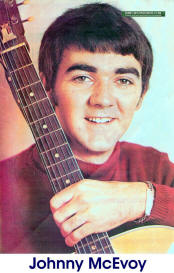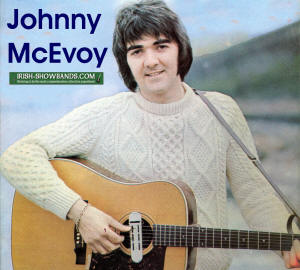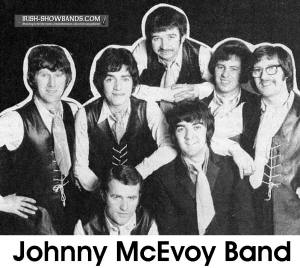Johnny McEvoy
Photo Gallery -
Band Lineups -
Discography
- Audio samples -
Where Are They Now?
The Story
 Born
in Banagher, Co. Offaly on the 24th of April, 1945, Johnny and his family moved
to Dublin when was six years old (1951) where his father was a bus driver. The
third youngest of four children, he went to school in Inchicore
and eventually enrolled in a commercial arts course in Rathmines.
Early on, Johnny wanted to become a commercial artist, but had
trouble landing a job without experience. After finishing the course, he landed a job with an advertising
agency and his parents were delighted.
Born
in Banagher, Co. Offaly on the 24th of April, 1945, Johnny and his family moved
to Dublin when was six years old (1951) where his father was a bus driver. The
third youngest of four children, he went to school in Inchicore
and eventually enrolled in a commercial arts course in Rathmines.
Early on, Johnny wanted to become a commercial artist, but had
trouble landing a job without experience. After finishing the course, he landed a job with an advertising
agency and his parents were delighted.
As a hobby, Johnny started singing
with Mike Crotty and the pair called themselves the Ramblers Two.
They had spent their time listening to bands like the Clancys.
Folk music had just made a big comeback in Ireland courtesy of acts
like the Dubliners, Ludlows, Wolfe Tones and Johnstons.
"Folk was just happening in the pubs and hotels
and we got a lot of work," said Johnny in a 1966 Spotlight
interview. Although the duo had some success, their time together
was relatively short. "After a time, Mike and I decided to quit the
double act, said Johnny, "there were no hard feelings, but I just
wanted to try it alone." News reports said Mick went back to
art school.
The year was 1966 and Johnny had
to decide whether to concentrate on the agency business, or pursue a
career in music. "Actually, it was an easy choice and money played a
major part in my decision," said Johnny. "I was getting £8 a week in
advertising after two years. As a solo singer I was a able to
make that much in one night. If it didn't click, there was always
America." Against his parents wishes, Johnny quit the day job and
became a full time entertainer. His first single release, Love
Minus Zero failed to make an impression.
The first advert we could find
that mentioned Johnny by name was in October 1966 when he was part
of a cabaret show that featured Noel Ginnity and others at the
Cuckoo's Nest in Greenhills, Tallaght. As was popular at the time, Johnny
was singing a mixture of Irish ballads and American folk. He wasn't
doing so well and decided to try his luck in America and wrote to
his sister who was already living in Kansas. In the meantime, he got
a job singing with Maureen Potter's Gaels of Laughter show at the
Gaiety Theatre in Dublin. Although he had filled out all the
forms and was waiting for his visa to come through, his manager, Tom
Costello, convinced him to give Ireland one more try. He decided
to record Mursheen Durkin and the rest, as they say, is history.
 The record went straight to the top of the Irish charts and made
Johnny an overnight sensation. Armed with an acoustic guitar,
harmonica and boyish good looks, Johnny took the country by storm. Early
in 1967, he released his follow up single, Boston Burglar to
even greater chart success. Johnny was now firmly established as one
of the country's top folk acts.
The record went straight to the top of the Irish charts and made
Johnny an overnight sensation. Armed with an acoustic guitar,
harmonica and boyish good looks, Johnny took the country by storm. Early
in 1967, he released his follow up single, Boston Burglar to
even greater chart success. Johnny was now firmly established as one
of the country's top folk acts.
However, despite the commercial
success of the two singles, Johnny was still worried, "I'm more
confused than ever," he said in a May, 1967 interview, "things are
going too well." He continued, "I seem unable to do wrong. Then you
begin to wonder what's going to happen."
Despite his reservations, he toured America and played in
Carnegie Hall, one of the highlights of his career to this day.
Even with the success, Johnny
continued to experiment and in a 1967 interview said, "It's no use
becoming accepted as a country and western singer or a pop-folk
artist. I want to be classed as an entertainer." During this period,
the big money was in the Irish ballrooms, which Johnny played on a
regular basis, one of the few solo acts to do so. "I just try to put
on a memorable show every night," he said, "never stay too long on
stage and even dancers seem to enjoy it." He toured American
in the summer of 1967 and went from strength to strength. He also
recorded material for his first album, using the rhythm section of
the Cadets Showband in the studio.
1967 saw Johnny change direction
slightly as he moved away from guitar backed ballads to a more
electric country sound. He signed a deal with John Keogh's
Greenbeats showband to back him in the ballrooms and his album,
For The Poor and For The Gentry, featured ballads along with
country music. It also featured Johnny's first self penned effort,
Reflections-Take One. This move was further fueled by
Johnny's own feeling that "the traditional scene is getting a bit
tired." (Spotlight interview, 19th July, 1967). In his own
story published in Spotlight in November, he said, "I have done all
I can do in Ireland."
 Johnny scored another number one
in early 1968 with Nora. However, the next few years were a
time of transition for Johnny and many other Irish artists. The real
money was still in the ballrooms, even though their heyday was drawing to a close. Many groups and folk artists all
faced the same dilemma: to make it in the ballrooms, you had to have
a band and play dance music.
Johnny scored another number one
in early 1968 with Nora. However, the next few years were a
time of transition for Johnny and many other Irish artists. The real
money was still in the ballrooms, even though their heyday was drawing to a close. Many groups and folk artists all
faced the same dilemma: to make it in the ballrooms, you had to have
a band and play dance music.
In an interview with B.P. Fallon
in the October 26, 1968 issue of Spotlight, Johnny complained about
the ballroom scene. "In a ballroom each night, a bit of your
incentive dies," he reflected, " A concert is a challenge because
people are better able to watch and criticise...ballrooms are so
drab and and so cold."
It would be three years before
Johnny would once again hit the Irish charts. In March, 1970,
Spotlight carried a major article outlining the formation of
Johnny's new country band. When
the Cadets broke up in early 1970, Gregory Donaghy went to Maisie McDaniel's new band, the
Ramblers
(strangely enough the original name Johnny used when he was paired
with Mick Crotty). At the same time, several of the remaining
members formed the basis of Johnny's new country band. The members
of his band were Brendan O'Connell (guitar), Noel McGann
(bass), Michael Keane from the Gamblers (keyboards), Alan Loughnane
(fiddle), Jimmy
Greely from the Orange Machine beat group (drums) and fellow
folk artist Tim Corbett (guitar). It was announced that
the new band would be called the New Horizons, but that name
never stuck.
In a 2014 Interview with
Henry McGlade on the Entertainment Ireland show (Irish TV)
Johnny explained the move to the showband scene. "When I was going
around on my own after Mursheen Durkin and Brown Eyes,
the only places I could work was in the ballrooms. So you'd have a
dance with a band on (they'd be playing for the dancing) and half
way through the night they would break and I'd go one for 45 minutes
as a guest star." However, it soon became impossible for the dancers
to accept such a long break in their evening's dancing programme.
Continued Johnny, "they didn't like anybody interfering with the
dancing and my work at the dances started to drop away." Eventually
Johnny and his manager thought "if you can't lick 'em, join 'em" and
he formed his country band.
Johnny seemed to be rejuvenated by
the addition of the band. In a 1970 Spotlight interview Shay Healy
noted that when Johnny took the stage he was, "alive and well and
happier looking than he has been for quite a while."
Johnny talked about the band's first gig which had been in
Manchester and they took the boat over from Dublin. Previously he would have flown
over by himself as a solo artist and in his own words, "I was
miserable," he added "this time there were six other guys to share
it with and the difference was incredible. It's great to have
someone to share the measure of glory and and the time before and
after."
In July, 1971 RTE launched the
Anna McGoldrick Show and Johnny was the first guest to appear on the
show. The year also started with Johnny releasing yet another chart
single, Three Score and Ten, another ballad which reached number 6
in the Irish charts. He followed this up later in the year with
Paddy's Green Shamrock Shores which failed to make an impression on
sales, one of few McEvoy records which did not make the
charts. Seeing Johnny with a country band was still a bit of a
curiosity for most Irish dancers and he needed a strong band to
ensure they got their money's worth.
On the TV and recording side,
things were going great for Johnny. He had his own series on RTE in
1972 and his next single, Gentle Annie, brought him back to
his familiar place in the top ten of the Irish charts, topping out
at number 8. However, the ballrooms were changing and Johnny knew
it. As bands like the Big 8 started to broaden their appeal by
playing everything, he felt the country band thing was in danger of
getting stale.
In June, 1972, it was reported
that Gloria Smith, who had joined up with the Linesmen Showband and
changed their name to the Cascades, was leaving to join Johnny's
Country Band. At the time, it seems like it was all the
rage following the success of female artists like Tina (Real McCoy),
Tracy (Grassroots)
and many others. Gloria was the eldest of nine
children from Navan and her father was Jimmy Smith, who
was the bandleader with the Arcadians Showband. From a very musical
family, Gloria not only sang, but played accordion and piano and had
released her own single in 1971, LA International Airport.
In 1973, Johnny had his own show
on the ITV network, "Sounds Like McEvoy" which featured his band and
Gloria and included a wide variety of artists from both the North
and South of Ireland. At the same time, he started doing solo
concerts again, although he claimed "I don't know if I'd like to be
doing them every night." An article in Spotlight exclaimed Johnny
was enjoying "the best of both worlds." Not only was Johnny doing a
couple of concerts every week, but he also explained that "the
cabaret thing should happen in the next two years."
More to come.
click on thumbnails for full image
Discography (More to come)
Singles:
Love Minus Zero / An Bonnan Bui (as the Rambler)
Pye Records - 7N.17164 - 1966
Mursheen Durkin / Those Brown Eyes (as the Rambler) - #1
Irish Charts
Pye Records - 7N.17196 - October, 1966
The Boston Burglar / I Still Miss Someone -
#1 Irish Charts
Pye Records - 7N.17303 - April, 1967
Funny Man /
Was It You - #10 Irish
Charts
Pye Records - 7N.17365 - August, 1967
About This Time / Bells Of Christmas Eve / Standing In The
Rain / Little Drummer Boy
Pye Records - NEP.24290 - November, 1967
Nora / Tarry Flynn - #1 Irish
Charts
Target/Pye Records - 7N.17472 - January, 1968
The Hedgehog Song / Time and Time Again
Target/Pye Records - 7N.17607 - September, 1968
Mary of the Curling Hair / Hickory Wind
Target/Pye Records - 7N.17770 - June, 1969
But That's Alright / Don't Talk To Strangers (with his country band)
Target/Pye Records - 7N.17938 - April, 1970
The West's Asleep / Happiness Is Love
Target/Pye Records - 7N.17988 - October, 1970
Three Score and Ten / You Win Again -
#6 Irish
Charts
Target/Pye Records - 7N.45033 - January, 1971
Paddy's Green Shamrock Shore / Just In Time
Target/Pye Records - 7N.45076 - June, 1971
Gentle Annie / Blue Canadian Rockies / Kentucky Woman - #8 Irish
Charts
Target/Pye Records - 7N.X7001 - February, 1972
It's Just The Way I Am / (Gloria Smith)
Unknown Records - Unknown - October, 1972
All I Have To Offer You Is Me / Spancil Hill -
#13 Irish
Charts
Target/Pye Records - 7N.60022 - November, 1972
Tomorrow Is Forever / Golden Jubilee // Just because I Am A
Woman / Kennedy's Fancy (with Gloria Smith) -
#14 Irish
Charts
Hawk Records - HASP 317 - May, 1973
Rose of Moray / James Connolly / Nora / Teardrop On A Rose /
Leitrim Queen -
#6 Irish
Charts
Hawk Records - HASM 2001 - August, 1974
Christmas Maxi EP
Hawk Records - HASP.2002 - December, 1974
Where My Eileen Is Waiting / Castle of Dromore -
#2 Irish
Charts
Hawk Records - HASP.364 - March, 1975
Rose of Allendale / Life of the Rover -
#6 Irish
Charts
Hawk Records - HASP.371 - August, 1975
Long Before Your Time -
#1 Irish
Charts (The first song recorded by Johnny which he
wrote himself)
Hawk Records - Unknown - June, 1976
Nora -
#7 Irish
Charts
Hawk Records - Unknown - July, 1977
Bound for Botany Bay / All In All -
#16 Irish
Charts
Hawk Records - Unknown - May, 1978
Just One More Night
Hawk Records - Unknown - November, 1978
The Old Rocking Chair / Lovely Lady
Hawk Records - Unknown - April, 1980
A Rich Man's Garden -
#14 Irish
Charts
MCA
Records - Unknown - December, 1984
Since Maggie Went Away / The Losing
Game
MCA
Records - MCA.953 - January, 1985
You Seldom Come To See Me Anymore /
Lusmagh Fields
Play
Records - PLAY.216 - 1987
Staten Island / Big Mansion House on
the Hill
Play
Records - PLAY.226 - 1988
Michael / Pat Murphy's Meadow
Play
Records - PLAY.237 - June, 1989
Round Round Angel -
#21 Irish
Charts
Play
Records - Unknown - June, 1990
Long Way From The Sun / Wheels Go Round
Play
Records - PLAY.257 - 1991
Albums:
For The Poor and
the Gentry
Pye Records - NPL.18190 - July, 1967
With An Eye To Your Eye
Pye Records - NPL.18264 - January, 1968
All Our Wars Were Merry, All our Songs
Are Sad
Target
Records - LNR.18324 - January, 1970
Sounds Like McEvoy
Hawk Records - HALP.117 - 1973
Best of Johnny McEvoy
Heritage
Records - HSLP.005 - January, 1975
Where My Eileen Is Waiting
Hawk
Records - HALP 143 - July, 1975
Golden Duets (with Gloria Smith)
Hawk Records - HALP 144 or 146 - November, 1975
Long Before Your Time
